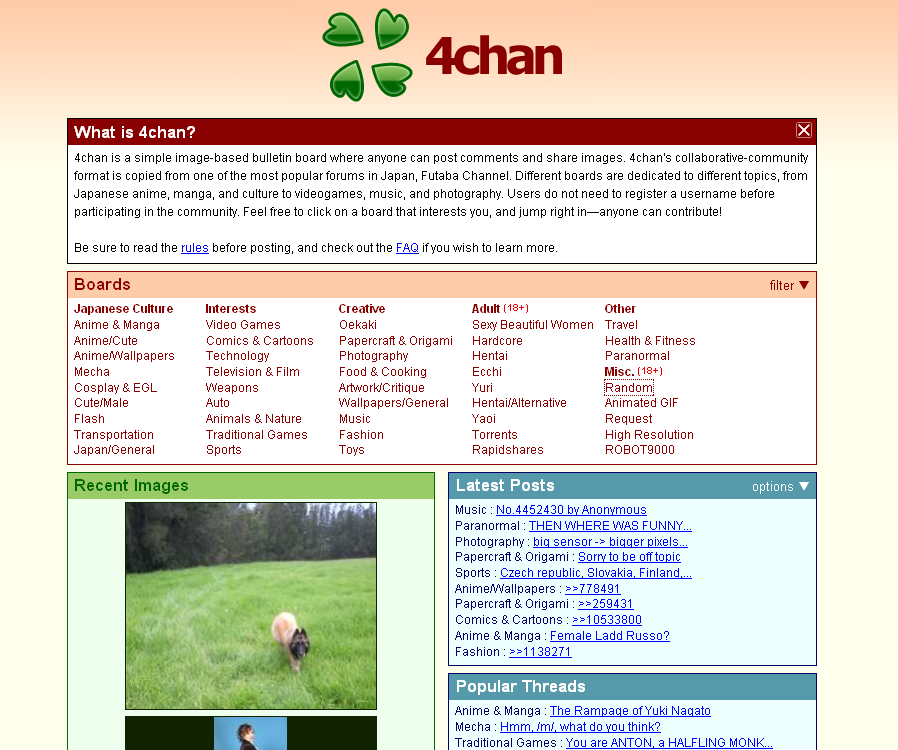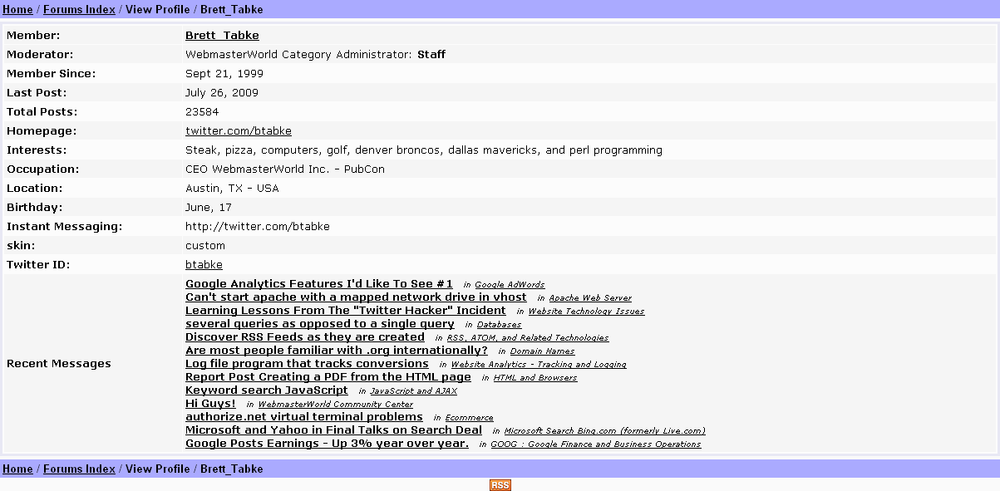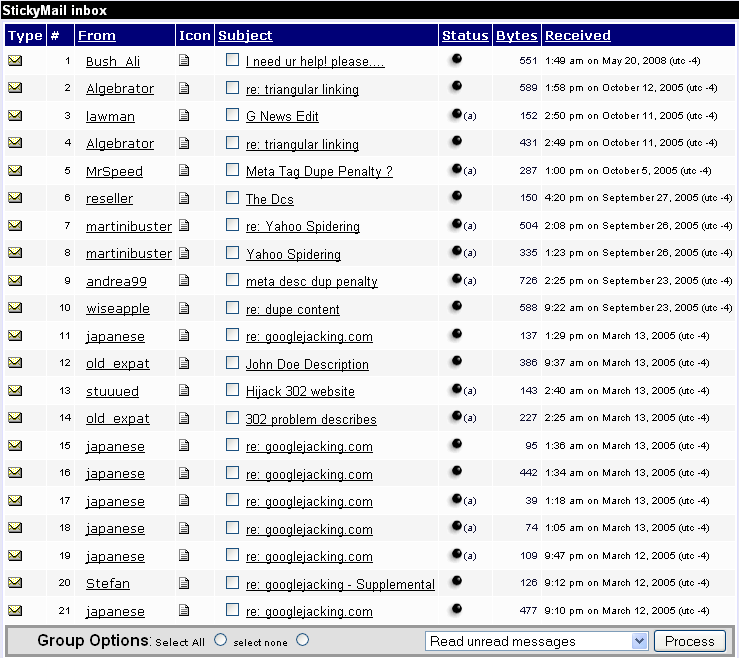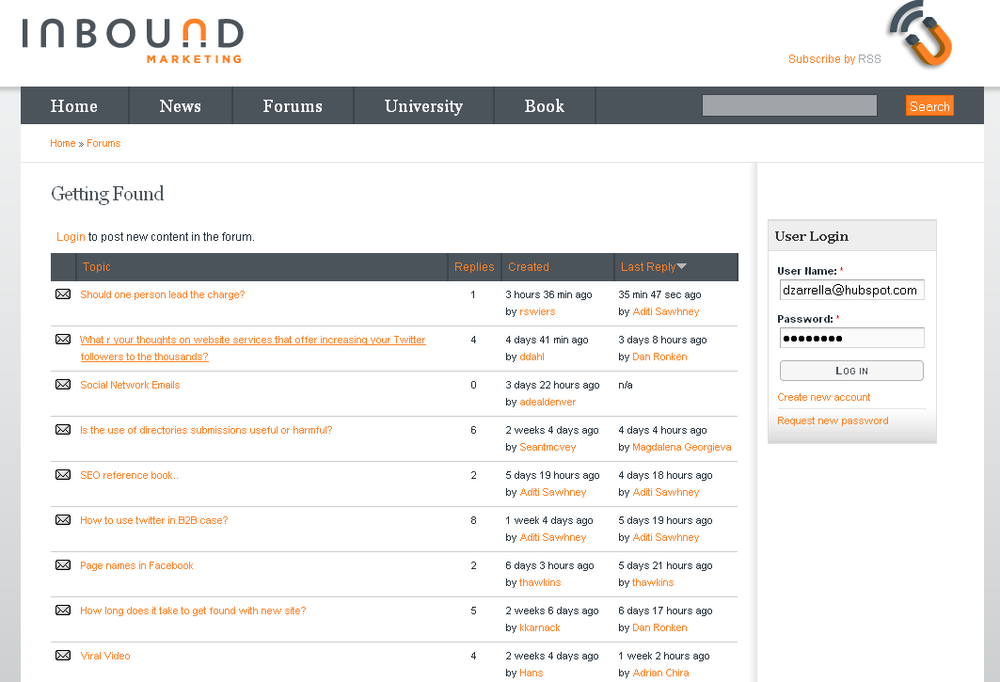Arguably the oldest type of social media, forums are a modern version of community bulletin boards. The focus of these kinds of sites is discussion. Users will make posts to them and others will respond. Become a valuable and respected member in one of these communities by answering questions and contributing useful information.
Unlike other types of social media, where there are a few major sites, there are thousands of popular forums on the Web, each centered on a single topic or community. Find the ones that are relevant to your business and engage them, but be careful, as forum users typically dislike obvious advertising.
In 1979, a distributed communication system called Usenet was created as a joint project between the University of North Carolina and Duke University. It was a type of mailing list that allowed users to post an article that other people could respond to. Conversations on Usenet were called message threads because of the linear post-and-response pattern. It is one of the oldest social networks still in existence.
Over the next few decades, Usenet spawned much of what we know as the Internet today—Tim Berners-Lee actually announced the launch of the World Wide Web on Usenet. Much of the slang we use today began on Usenet, and a strong argument could be made that web spam first happened there, too.
Modern threaded discussions happen on sites known as forums. Unlike social networks, there is no single dominant site in the United States—instead, there are several hundred fairly popular forums. One of the largest in English is 4Chan (see Figure 8-1). Conceived as America's answer to Japan's hugely popular anime discussion forum 2Channel, 4Chan has spawned some of the largest and most pervasive recent Internet sensations, including LOLcats and Rickrolling.
Forums since Usenet have had insular communities with inside jokes and jargon, and new members—known as newbies or n00bs—are often ridiculed (especially on the more elitist sites such as 4Chan). Marketers should be aware of this and dedicate much time to developing a deep understanding of each community's individual rules and culture before jumping in.
Forums are one of the oldest forms of web-based social media, and each one has its own culture and rules. Most forum platforms include a number of software features. This section will cover those features.
Your profile on a forum is a representation of who you are. You'll typically be able to write a short bio about yourself and provide some simple personal information (see Figure 8-2).
The most important part of profile setup is your avatar. This is an image that will be displayed next to every post you make, so choose it wisely. If your account will represent you personally, you should choose a good personal photo for your avatar, perhaps the same image you use on Twitter. Otherwise, you should make your avatar an extension of the brand you're promoting, by using a logo or similar colors. But remember: profiles are best used for individuals, not companies.
I know it sounds creepy, but it's not. Lurking simply means spending a lot of time reading posts and observing how the community operates before you start contributing. This is a good idea, and forum rules and site owners usually suggest it.
You communicate on a forum by writing posts. A post is traditionally a short text-based piece of content, but some types of forum software allow you to upload and attach images as well. A post will be labeled with the date and time of creation, as well as the poster's username, avatar, and possibly some kind of reputation value.
Conversations on forums are organized into threads, with posts listed in chronological order from earliest to most recent (see Figure 8-3). The first post—called the original post or OP—is at the top of the thread, with response posts listed below it. Forums are divided into categories, and threads are listed on each category's page, with the threads that have had new posts most recently at the top.
When replying to a thread, stay relevant to the OP. Changing the topic or point of a thread is known as thread hijacking and is frowned upon.
Before you start a new thread, familiarize yourself with the rules and community of the forum—lurk for a while before doing this. And search the forum for similar posts to be sure you're not duplicating an existing thread. Be especially careful when posting marketing content. Ensure that the rules of the forum allow this, and remember that even if they do, marketing content might not be well received by the community. Creativity here will help get your message across in a palatable form.
The owner(s) and other trusted individuals from a forum's community are known as moderators (mods) or administrators (admins). Their job is to prevent spam, enforce forum rules, keep discussions on topic, and settle disputes between members.
As a new community member, and especially as one who is interested in marketing through a forum, you should be very nice to mods and admins, since you'll need them to like you. If you can become friends by sending out some gifts or doing favors for them, do it.
Some types of forum software contain a feature known as a signature (sig for short). These are short text or image messages that are appended to all of your posts (see Figure 8-4). These can be very useful for you as a marketer, but you'll need to read the forum's rules regarding signature conduct—some forums allow banner ads or commercial links, and some do not. Be clear in your understanding of what is acceptable and what is not.
Your signature will appear on every one of your posts, so don't make it too long, as it gets annoying for other users to be forced to scroll through it. If the forum allows images, this can be a good place to introduce some of your company's brand, especially if you're following best practices and your avatar is a picture of you.
A profile will often be assigned some value as a measurement of its reputation on that forum. In some cases, reputation is calculated by the sheer number of posts you've made on the forum; in other cases, it is a measurement of how much other people have liked your contributions. If the forum supports reputation, it will be displayed next to your avatar on your posts.
On some forums, members will be assigned levels based on their reputation points. A martial arts forum I'm fond of gives out different color belts.
Like social networks, forums allow you to send private messages (PMs), which function much like emails, to other members (see Figure 8-5). If you want to start developing a relationship with an important user or mod, send him a PM introducing yourself and offering whatever help you can. It bears repeating that sending a ton of these is considered spam, and it's more useful to keep your content in the public eye anyway. When in doubt, post your messages on a thread rather than a PM.
A flame is a post designed to do nothing other than incite heated reactions. Flame wars typically ensue after emotional discussions on things people are especially passionate about, such as operating systems, sports teams, politics, and religion. As you get to know a community, you'll start to understand which topics to tiptoe around.
A troll is a person whose only intention on a forum is to annoy people. Typically a new and faceless member, the troll specializes in pushing buttons and stirring up trouble. He delights when you lose your temper, and when he finds out that you work for a specific company, he'll be taking shots at your products. He feeds on attention and emotion. The only good way to defeat a troll is to ignore him; many forums have a "don't feed the trolls" rule. There is a difference between a troll and a good member criticizing your business; learn to spot the difference, and address the legitimate concerns of the latter.
The first step in forum marketing is to identify relevant and popular forums to join. A good place to start is a search on forum tracking and ranking sites such as the following:
Enter a few keywords about the product or company you're trying to promote, and click through to find related forums. Look for signs of popularity, and check how many members and threads it has and how recently they've been posted to. Focus on the large and active sites. Figure 8-6 lists the most popular forums on the Web.
Note
While marketing a geek dating website, I created a promotion centered on a lip gloss giveaway to attract women. I was frustrated with many social media sites, since they were full of twentysomething guys, so I stopped promoting it for a while. When I logged in to check the site's traffic a few weeks later, I was shocked to see a huge uptick in visits coming from a bunch of different forums. It turns out that a member of a small "freebie" forum had found my offer and posted about it, and within hours it was reposted to hundreds of other sites. My efforts prior to that had created an initial spike in traffic that faded off after a few days, but this time the hits kept coming for weeks.
Don't underestimate the power of networks of niche forums to drive impressive numbers of visitors to your site, and remember that the best promotion doesn't come from you, but your fans.
When you find a forum that you'd like to start working with, set up an account. Reputation systems are often based in part on account age, so you'll want to create yours as soon as possible—but don't start posting right away.
Before you even think about contributing to a new forum, spend some time lurking to learn about the forum's culture and community. Some forums don't allow members to post links to their own sites, and some forbid promotion or marketing of any kind. Read the rules and get to know which members are well known and trusted. Forums can be a minefield of unspoken rules and social taboos, and one wrong step by a marketer can be crippling to her reputation (see Figure 8-7).
There are a bunch of "forum marketing" services that the lazy marketer may be tempted to hire; resist these. Outsourcing your forum marketing is an easy way to wreck your reputation, as the vast majority of these services will be creating hundreds of accounts on as many different sites, only to post blatant advertisements devoid of any value to you or the forums.
Once you've gotten to know the lay of the land, you'll know if and when an introductory post is acceptable. If it is, do it and do it well. Be transparent about what company you work for and what your role is; if you're a marketing person, admit it. Highlight your unique skills and knowledge that will be useful to the community, and make a commitment to never spam or blatantly promote your wares. Make sure other members know you're approachable and that you appreciate feedback.
Figure 8-8. In this example, a forum user is asking for advice. Marketers should be all over this kind of post.
Your modus operandi in a forum should be to provide value (see Figure 8-8), answer as many questions as you can, and be as helpful as possible. Be consistent in your forum marketing efforts; once you've decided a certain site is worth your while, dedicate an amount of time every week or day to it and post regularly. Don't be a hit-and-run poster.
I asked Brett Tabke, founder of WebmasterWorld, one of the largest marketing communities on the Web, how marketers should approach forums. His advice was to remember that you can only reach out to people who want to be reached, and that by serving the community rather than promoting your brand, you can earn its respect. He also suggested that you get in the habit of starting quality threads as opposed to just replying to existing ones.
Regardless of the site's rules about promotion, you should not spam any forum. Avoid outright product pitches, and definitely don't post the same message multiple times on the same site.
Forums can be full of personal politics and negative sentiments, and you should avoid getting embroiled in them at all costs. Do not be caught bad-mouthing your competition or other members of the community. If you don't like the people you're communicating with, just leave. Brett says that the best way for members to deal with trolls and flame wars (see Figure 8-9) is to simply ignore them.
One of the early bibles of social marketing was The Cluetrain Manifesto by Rick Levine et al. (Basic Books). In it, the authors suggest that companies should sponsor forums centered on their products or the communities they serve. A forum built and run by your company—if it succeeds—can do wonders for your social marketing. But that is a big if.
The decision to start a forum should not be taken lightly. Forums represent large investments of time and energy, and require a fair amount of technical ability to set up, design, and maintain. As it begins to grow, the forum will require an ever-increasing amount of effort to moderate and support.
Beyond the time it will take to build a forum, a considerable amount of marketing effort is also needed to attract and retain a viable community. If there are already popular forums in your niche—and this is true for most categories—this will become even more of an uphill battle, and your efforts will best be spent becoming a respected member of existing sites as opposed to trying to start from scratch. As Figure 8-10 shows, you don't want an empty forum.
If you are determined to start your own forum, make sure you do your homework before beginning. Research your market to identify existing forums (if you find large ones, reread my earlier advice). Have a robust understanding of what your company can offer a community that it can't get elsewhere. For instance, do you have inside information or unmatched expertise and experience? A vintage car restoration shop could start a forum with the goal of answering questions about the personal projects of its members, building thought leadership in the industry, and forming relationships with old-car enthusiasts. As another example, the popular purse forum shown in Figure 8-11 allows members to post links to handbags for sale on the Web to be authenticated as fake or real.
Brett said that prospective forum admins should read everything they can about forums and communities on the Web and study other sites in their niche. He also pointed out that you shouldn't expect overnight success; good communities take years to build.
A number of options are available for software on which to build your forum, and many are open source. Unless you are a technical person, you should leave these decisions to the technically savvy person who will be building and maintaining the forum. If you don't have a developer or IT resources available, you should be looking for some before moving ahead with your forum.
Here are some of the more popular software options available for building a forum:
- vBulletin (http://www.vbulletin.com/)
vBulletin is a commercial forum software package that runs many of the Web's largest message boards. It is written in PHP and uses a MySQL database, meaning that it runs on Linux or Unix. According to Big-Boards.com, vBulletin is the most popular forum software.
- Invision Power Board (http://www.invisionpower.com/)
Invision is listed as the second most popular forum software package. It is open source and built on PHP and MySQL.
- phpBB (http://www.phpbb.com/)
phpBB is an open source forum system that has been in development since 2000. It runs on PHP and MySQL, and Big-Boards.com ranks it as the third most popular package.
- Drupal
One of the most popular open source content management systems (CMSs), Drupal can be configured to create nearly any kind of community site, and includes a robust forum system. It is written in PHP and runs best on a Linux or Unix server.
At the time of this writing, we at HubSpot are in the process of launching our own community site for marketers—InboundMarketing.com—that is built on Drupal (see Figure 8-12). The forum is the most popular section of the site at this point. We have several development teams in-house, as development, design, and maintenance require a significant investment of time.
Forums are a great way to build a reputation in a specific niche online.
Lurk, lurk, and lurk some more; get to know the community before you start posting.
Contribute, don't pitch. Hard selling won't work.
Become a part of the community; don't be a hit-and-run poster.
Starting your own forum can be rewarding, but it is a ton of work, so be sure to do your homework.












